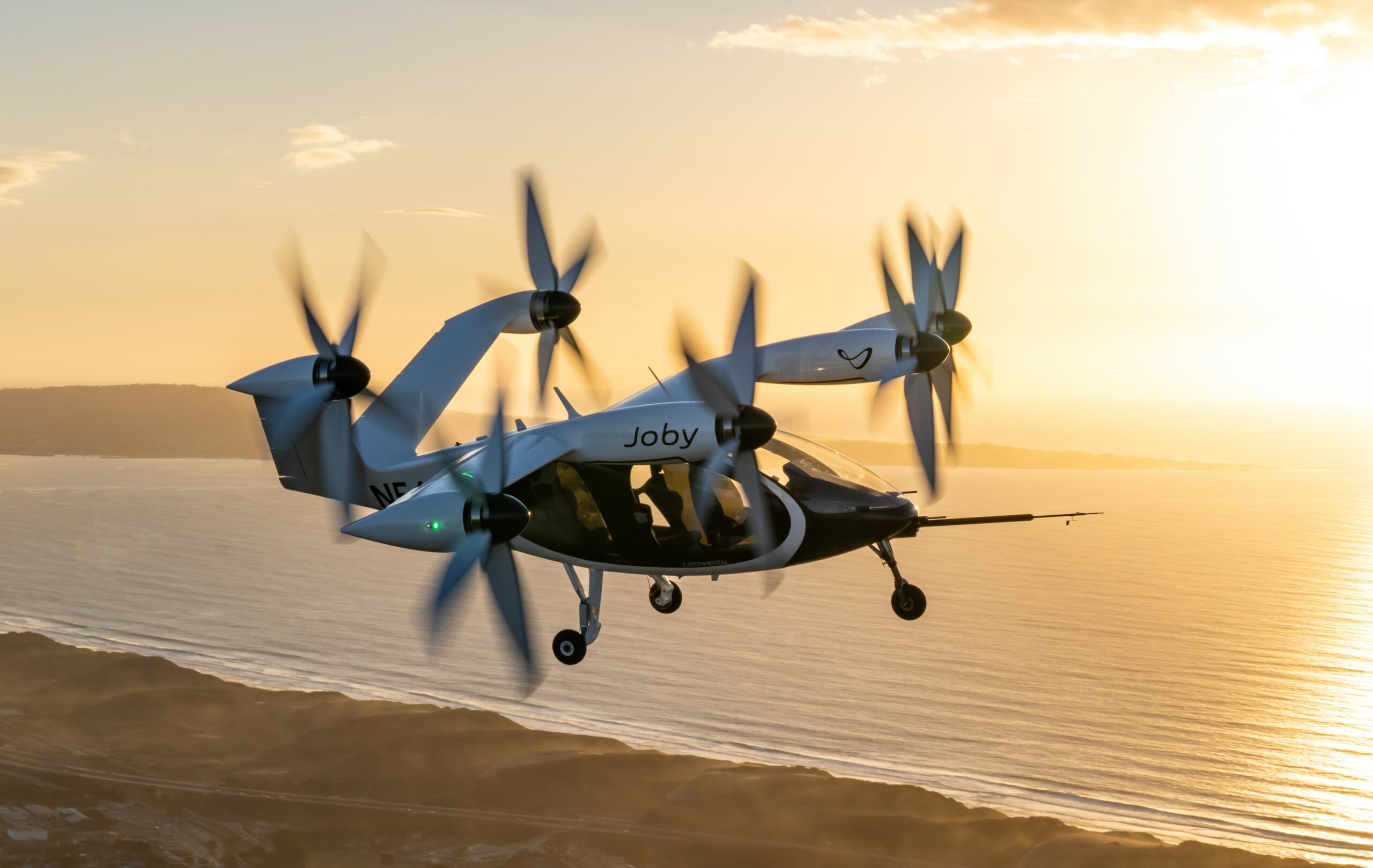
28 Joby Aviation Aircraft scaled
UPDATE – Five major eVTOL start-ups announced various program updates last week for their Advanced Air Mobility (AAM) programs, both technically and financially. This includes Joby Aviation flying its first production aircraft, Vertical Aerospace making good progress with its first prototype, Lilium’s funding update, Archer securing a contract with the Us Air Force, and Eve Air Mobility getting a new CEO.
Joby Aviation
Joby Aviation said in its Q2 shareholder letter on August 2 that it has successfully flown the first production aircraft in late July. The aircraft joins the pre-production aircraft, that have flown a combined 30.000 miles. The production aircraft conforms to the full design specifications and quality management procedures. This specific aircraft will be delivered to the US Air Force in early 2024 as part of the $131 million Agility Program contract to flight test the vehicle for crewed and cargo operations. The second production aircraft is currently on the production line.
Joby has submitted all certification plans to the FAA, which is two-thirds through accepting them. The next phase is Phase 4 or Testing & Analysis, to execute test plans and demonstrate compliance with safety regulations. Phase 5 is the Show & Verify phase, which will lead to certification and hopefully entry into service in 2025.
The start-up ended Q2 with a $-286.1 million net loss and an operating loss of $-170 million. For HY1, the net loss was $-399.5 million, and the operating loss was $-183.7 million, with $215.7 million of operating expenses. Joby ended June with $1.2 billion in cash, cash equivalents, and marketable securities, thanks to new investments from Baillie Gifford ($180 million) and SK Telecom ($100 million).
Vertical Aerospace
Following its first untethered flight in June, Vertical Aerospace has made further progress with the flight test program of the VX4. Three untethered and unpiloted flights have been done at Cotswold Airport, flying on electricity from the vehicle’s own battery pack and reaching speeds of forty knots/seventy kilometers per hour.
The flights demonstrated that the vehicle was drawing “significantly less” power from the battery pack during the hover phase, which should increase range and endurance. The handling also was better than expected, with the Honeywell fly-by-wire flight control system performing precisely. The thrustborne flight regime was expanded to over forty percent of the transition envelope of the vehicle, in which the rotors were partially tilted into their horizontal flight position. Also important: there were no faults during the flights.
Lessons from these first flights will be fed into the second prototype, of which production will be completed later this year when the first crewed thrustborne flights have been performed. This vehicle should have better performance in hover, including range. Work will also continue to develop and optimize the propellers for more efficiency and less noise, for which a Generation 2 propellor blade has been designed.
Vertical says that its certification program with the CAA is progressing well, with technical familiarization sessions that will also include the FAA and EASA later this year. The means of compliance and test plan, compliance demonstration and testing, and certification phases will follow. Vertical received Design Organization Approval in May, which allows it to manufacture the VX4.
Vertical ended June with £89.7 million in cash and cash equivalents, which will be adequate to finance its plans into the second half of 2024. But CEO Stephen Fitzpatrick said in the Q2 shareholder letter that the company will raise another £80 million in the coming twelve months to cover the cost of the development of the second prototype and the flight test campaign. Vertical reported a £-36 million operating loss for HY1 or a net loss of £-11.8 million. Net cash outflow from operating activities was £33.1 million, almost half that of last year, and are guided at £40 to £45 million for HY2.
Lilium
Lilium released its Q2 shareholder letter on July 25, in which it said that a $192 million capital increase has recently been completed from a public offering and private placement. The latter was supported by German technology investors Earlybird Venture Capital, BIT Capital, UVC Partners, and Frank Thelen, plus Lilium Board members and senior executives. This brings funds raised in the past three months to $292 million. Including cash and cash equivalents, this brings the total liquidity of the German company to $386 million by the end of June. Lilium remains on the lookout for more funding to support future funding requirements.
Lilium received approval for the first phase of certification under FAA G1-guidelines in the US and says it is on track to receive Design Organization Approval from EASA later this year. Assembly of the first type-conforming Lilium Jet started in Q2, with the aircraft scheduled for its first manned flight in late 2024. EASA certification is still planned for late 2025, with the compliance demonstration phase, and technical closure and issue of approval phases to be completed.
The company ended HY1 with €113 million in cash spent and expects €170 million for HY2.
Archer
Archer will release its HY1 results on August 10 but announced last week that it has expanded its contracts with the US Department of Defense by signing new contracts with the US Force worth $142 million. As part of an extension of the existing AFWERX program, Archer will deliver six Midnights that will be evaluated during tests of personnel transport, cargo, rescue missions, and more. The first production aircraft was completed in May.
With a targeted payload of 1.000 pounds, the Midnight could fulfill a useful role in multiple operations of the Air Force, but this will have to be demonstrated in flight tests just as is being done with Joby.
Johann Bordais will be the new CEO of Eve Air Mobility. (Embraer)
Eve Air Mobility
Eve Air Mobility announced a $-31.4 million net loss for Q2 compared to $-107.2 million in the same period of last year, driven by higher R&D spending of $21.8 million. For HY1, the net loss was $-57.2 million versus $-117.2 million. Eve had $269 million in cash and cash equivalents by the end of June, down from $294.6 million, or $370.7 million if undrawn facilities are included.
HY1 milestones have been the selection of three major suppliers. As announced during the Paris Airshow, Embraer and Nidec will form a joint venture to produce electromotors, with Eve the first application. BAE Systems was selected as the battery supplier and DUC for the rotors and propellors. An existing Embraer site at Taubate near Sao Paulo has been selected as the first production site. Assembly of the first aircraft will be completed in HY2 and should start ground and flight tests next year.
Last week, Eve announced some leadership changes. Current CEO Andre Stein will assume the role of Chief Strategy Officer and will be based in the US to define Eve’s long-term strategy, having been involved with the project since the start. The day-to-day running of Eve will be taken over by Johann Bordais, who has been the CEO of Embraer Service & Support since 2016 and helped to transform and grow the business unit.
Following the completion of the launch phase of Eve, Ken Ricci will resign from the Board of Directors and will be replaced in October by Jerry DeMuro, who is Executive Vice President of Corporate Development until late October.
Views: 118






Very nice to see most of the really interesting concepts in one list. If you think abbout the more afforable ones you might add: Skyfly, http://www.skyflytech.com; Air, http://www.airev.aero and Flytouse http://www.flytuse.com/en/products.html.